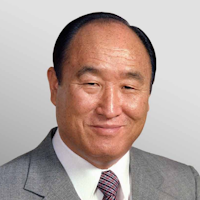When people say “peace,” what are they talking about? They are not talking about peace itself, but a mutual relationship… There can be no peace unless there is love.
Sun Myung Moon

There Has to Be Love
Topic: Global Peace & Development
When people say “peace,” what are they talking about? They are not talking about peace itself, but a mutual relationship… There can be no peace unless there is love.
Sun Myung Moon (born January 6, 1920, in Jeongju, in what is now North Korea – died September 3, 2012, in Gapyeong, South Korea) was a Korean religious leader, entrepreneur, and founder of the Unification movement. Raised in a rural Confucian-Christian household during the Japanese occupation of Korea, Moon’s early life was shaped by hardship, devotion, and a strong sense of spiritual calling. As a teenager, he experienced a profound vision in which he believed Jesus commissioned him to complete the work of restoring humanity to unity with God. This revelation became the foundation of his lifelong ministry, devoted to the ideal of universal peace and the healing of the relationship between the divine and human families.
In 1954, after enduring persecution and periods of imprisonment under both Japanese and communist authorities, Moon founded the Holy Spirit Association for the Unification of World Christianity in Seoul. His teachings—later presented systematically in the Exposition of the Divine Principle—offered a reinterpretation of Christian theology emphasizing God’s parental love, human responsibility, and the sanctity of marriage and family. Central to his vision was the belief that love is the creative force of the universe and that humanity’s purpose is to build a world reflecting the oneness of God’s heart. Through international missions, interfaith dialogue, and mass wedding ceremonies symbolizing global reconciliation, Moon sought to transcend divisions of race, religion, and nationality.
Beyond his religious work, Moon established numerous organizations in education, media, culture, and humanitarian service, aiming to foster dialogue, moral renewal, and peace. He and his wife, Hak Ja Han Moon, were regarded by followers as the “True Parents,” embodying the ideal of restored unity between men and women, heaven and earth. While his movement inspired both devoted commitment and significant controversy, Moon’s influence on global religion, culture, and peace initiatives remains substantial. His life reflected an unwavering pursuit of the vision of one human family under God—a vision he advanced with conviction, discipline, and enduring faith in the transformative power of divine love.
Wilson, Andrew, editor. World Scripture II. Universal Peace Federation, 2011, p. 1076 [Teachings of Sun Myung Moon ((175-196, 1988.04.17)].

Sun Myung Moon
Theme: Peace

About This Sun Myung Moon Quote [Commentary]
Sun Myung Moon’s quote, “When people say ‘peace,’ what are they talking about? They are not talking about peace itself, but a mutual relationship… There can be no peace unless there is love,” eloquently captures the essence of his spiritual and philosophical teachings. At the heart of this quote is the idea that peace is not a standalone concept but rather a product of relationships nurtured by love. Reverend Moon challenges the conventional understanding of peace as merely the absence of war or conflict, instead presenting it as an outcome of love-filled relationships.
Reverend Moon’s perspective on peace is deeply intertwined with the concept of love. By stating, “There can be no peace unless there is love,” he emphasizes that peace is not just a passive state of harmony but a dynamic process that is actively cultivated through love. This approach positions love as the foundational element of peace—a unifying force that binds individuals together, fostering understanding and respect. It’s a reminder that peace begins at the most basic human level, in the way we interact with one another, and how we nurture our relationships with compassion and understanding.
Moreover, Sun Myung Moon’s quote invites reflection on the broader implications of peace in our lives and society. It suggests that peace transcends individual existence and becomes a collective experience, shaped by the quality of our relationships and the presence of love. This holistic view encourages a reevaluation of our approach to peace—not as a distant, abstract goal but as an intimate, living process that we actively participate in through our daily actions and interactions. Reverend Moon’s words resonate with a profound truth: peace is a journey, not a destination, and it is through our continual efforts to love and connect with others that we walk this path.
Additional Sun Myung Moon Quotes About Peace
Related Quotes
Copyright © 2017 – 2026 LuminaryQuotes.com About Us